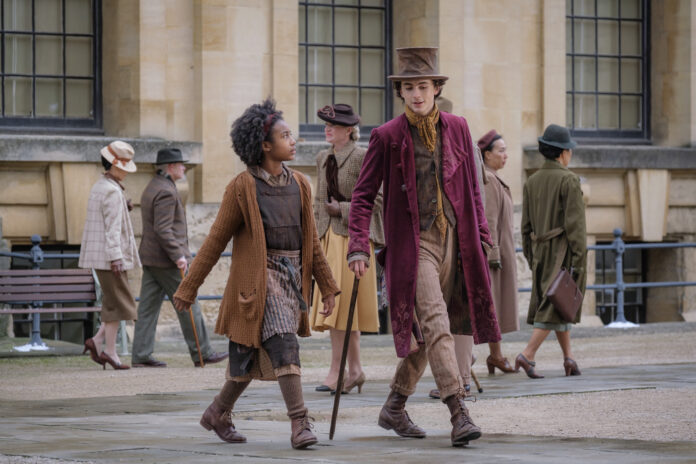A warm family film that could’ve been explored more
By INDRANIL BASU — arts@theaggie.org
“Wonka,” directed by Paul King and written by King and Simon Farnaby, was released in December of last year under Warner Bros. Pictures. The film has been a commercial success and well-received by audiences and critics. It became the 70th-highest-grossing film of 2023 and was nominated for awards including the BAFTA Award for Outstanding British Film and the Golden Globe Award for Best Actor – Motion Picture Musical or Comedy (for Timothée Chalamet).
This musical fantasy comedy film is premised on the origin story of Willy Wonka, the well-known character from Roald Dahl’s famous children’s novel, “Charlie and the Chocolate Factory,” starring Chalamet in the titular role. King uses Dahl’s body of work to visualize his backstory and create a fantastic exploration of the intriguing personality of Wonka.
Set in a vague 1940s European city, Wonka arrives as a young man, inventor, magician and chocolatier after spending seven years as an innovative chef at sea. He is ready to make a fortune, and more so a life for himself, with his chocolatey inventions that he has perfected during his time and travels across the world. The film follows his journey of achieving that dream, one strongly connected with themes of family — both blood and chosen — and generosity.
“Wonka” is well written, in terms of plot, dialogue and lyrics, as well as brilliantly filmed by Chung-hoon Chung and scored by Joby Talbot. The musical numbers are well-worked, performed (mostly) by Chalamet, and created but don’t stand out too much vocally in the way they are composed or sung.
Chalamet as Wonka fits into the image of the beloved character in the overcoat, hat and cane, with a suitcase full of his inventions and dreams, as iconized in previous films by Johnny Depp in “Charlie and the Chocolate Factory” (2005) and Gene Wilder in “Willy Wonka & the Chocolate Factory (1971),” though definitely drawing more from the latter in its characterizations. He seems out of place in his young boy-next-door looks with ruffled hair and American accent, which match Wonka’s background if we consider him American and the film as a modern interpretation of him (which it is in many ways).
He is simple, friendly, innocent and giving, unlike Depp’s portrayal and, more importantly, the novel’s sassy, socially awkward, apathetic and androgynous Wonka who is the embodiment of eccentricity. The filmmakers run with the straighter 1971 version of Wonka who is none of those but innovative — rather an aspirational underdog the audience can relate to, which he perhaps was before making it as a chocolatier and becoming the pop culture phenomenon he is seen as in previous appearances. Although the filmmakers have stated that Chalamet was their top choice for casting, perhaps someone else could have captured the fantastic seed of eccentricity that must have still been in him as a young adult, one that the film could have explored more.
The ensemble cast delivers wonderful supporting performances in the film: particularly Calah Lane as the orphan girl Noodle, whose character arc is significantly in parallel with Wonka’s; Keegan-Michael Key as the corrupt Chief-of-Police Paterson Joseph; Matt Lucas and Mathew Baynton as the “Chocolate Cartel” leaders; Jim Carter as the accountant Abacus Crunch; Olivia Colman as the evil Mrs. Scrubitt and Hugh Grant as the singular Oompa-Loompa of the film.
The film is definitely a “savage indictment of capitalism,” as the filmmaker has stated himself, especially in Western socio-political structures, with a hugely corrupt (three)-man monopoly (on chocolate) that is constantly colluding with the church and the police and using (chocolate as their currency of) bribe to maintain their hegemony and the large economic gap between them and the consumer.
Daydreaming comes with a fee in this economy. Some of the language, however, such as a chocolate “cartel” for the corrupt oligarchy of the three Galéries Gourmet Chocolatiers, or “monks” for the “chocoholic” clergymen, is fairly questionable. It makes a good critique of capitalism but falls just a bit short on Wonka as a character and leaves it to the viewers to bridge the gap between him at the end of this film and the beginning of Wonka as we know him.
“Wonka” is a good film to watch with family, with its themes of family, love and sharing over greed and dreaming. The movie maintains a visual spectacle with excellent set and costume design that absorbs the audience into an earlier fantastical era in Europe and its musical numbers. You will understand Wonka as someone just like us, and discover the story of his drive for spreading happiness by making chocolate. Be ready to shed a chocolatey tear of joy. “Wonka” is now streaming on HBO Max.
Written by: Indranil Basu — arts@theaggie.org





